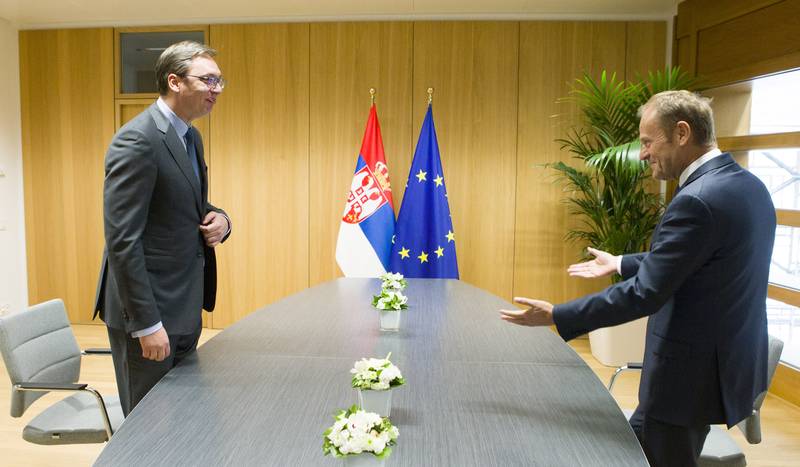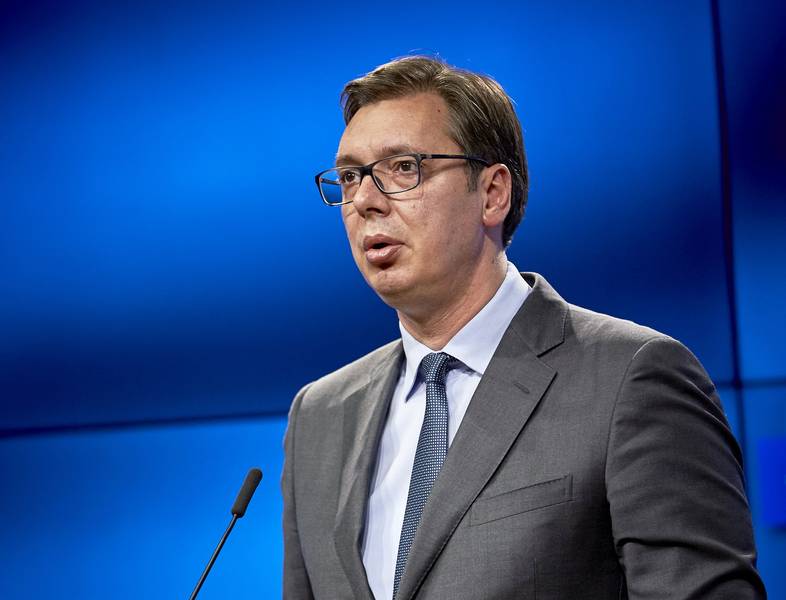Time for Serbia to Make a Genuine Choice
Adelina Marini, July 14, 2017
Who could have guessed that all the hoorah about Serbian Prime Minister Anna Brnabić's statement in an interview for Bloomberg that if she had to make the decision, Serbia would choose the EU over Russia, is actually a preparation for the real decision-making!? 11 days after the interview was published, Serbian President Aleksandar Vučić met in Brussels with European Council President Donald Tusk (Poland, EPP) and faced a serious choice if the two leaders' statement after the meeting could serve as reference. For years, Alexander Vučić has been trying to balance between the EU and Russia by saying that Serbia has made its strategic choice and that is the EU, but Russia is a friendly country with which Serbia intends to continue to develop relations. As an argument, Serbia's political leadership pointed out that even countries in the EU itself keep close ties with Moscow, including Germany.

Donald Tusk clearly pointed out that Serbia's membership depends on three things. The first (order not important) is to think about its future relations with Kosovo, which means also considering the option of recognition. The second is to give up on Russia, and the third is to introduce the rule of law. It became clear from Tusk's words that the EU has no illusions about what is happening in Serbia and the region, nor about who has what responsibility for that. "After a rather turbulent start to the year, today Serbia engages in dialogue - talking to, not at, each other - and I welcome your continued commitment to the Priština-Belgrade Dialogue and your readiness to pursue, domestically and with Kosovo counterparts, a further reflection on future relations."
Another part of the European president's speech speaks clearly about the lack of illusions: "Finally, I encouraged President Vučić to pursue reforms to strengthen the rule of law with the same vigour and consistency as progress on the economy. A strong and robust rule of law is the ultimate signal that you are ready to enter the EU". This is personally aimed at Aleksandar Vučić who, during his term as prime minister, emphasised on economy in his public statements, while tightening his control over the state and undermining the independence of its institutions. It is obvious that this has not remained unheeded in Brussels, which until recently remained silent and made Vučić feel untouchable.
An end to that was put today (14 July), as was clearly evident from the Serbian president’s looks. There was no sign of his usual self-confidence and conviction that the EU needed Serbia more than vice versa. He said talks focused on the most important topics and not on the technical issues like the opening of chapters, which in itself is a huge recognition from both sides that enlargement has long been not just a technical process that is reduced to opening chapters. Vučić admitted another thing, namely that he has learned a lot today about the EU's positions on various issues and addressed the Serbian audience by saying that they will finally have to make all the necessary reforms, including those that affect the rule of law.
This topic, as well as regional issues, were at the heart of the talks, he said. The greatest focus was on Kosovo. Vučić was very cautious and carefully selected his words on this subject saying that there was talk about the perspectives, about the Serbian vision of how this process (the dialogue with Priština) could be completed, how exactly could both sides - Belgrade and Priština - be equally satisfied "or dissatisfied". The second term is a clear sign that the option of Serbia recognising Kosovo has been discussed, which will cause very sharp reactions in Serbia itself. However, the EU expects Serbia to hold this conversation with itself.
The "Russia" subject is also obviously placed on the table in the "either-or" mode. "At the same time, we were discussing also Serbia's foreign policy and, of course, we were facing some remarks from my friends", Vučić said immediately after explaining about the Kosovo issue. He added that he has done his best to explain to former Polish Prime Minister Donald Tusk, whose country is a zealous defender of Ukraine and looks at Russia as an enemy, the Serb position, and that he "mostly does understand" it. On this subject as well Mr Vučić carefully selected his words and suggested that some positions "may be to change it in the future if we want to be a full fledged member state to the EU". This statement is the proof that Serbia has been offered to choose.
Until this happens, Serbia will not get a concrete date, as it insisted. Only two days ago, Aleksandar Vučić said in an interview for Serbian TV Happy that it is high time the EU answered whether it is interested in Serbia's membership and within what timeframe. "This is a key issue for us, and we no longer want to listen to promises and procrastination", Vučić said on July 12th. However, the EU has also long been expecting Serbia to make its real choice and declare if it really wants membership, which means giving up Russia and Kosovo as well, and starting to do the reforms, which are really important to the Union. In Brussels today, Vučić sounded differently. He said he hoped to get some timeframe as this would be "more motivating" for the Serbs, but because of the general situation in the EU itself and the overall atmosphere around the enlargement process it was not possible, he explained. The EU does not seem to be in the mood for this type of sweetener, but has made a serious financial commitment in Trieste (more on that in a separate text).

Initially, Vučić sounded like Serbia is really going to make this strategic choice, but at the end of his speech he said Serbia remains firmly on the European path. "I believe these people and I think that Serbian citizens, we need to do many more things. When we do it almost certain will become a member of the club", he said, adding that he felt at home. Donald Tusk, for his part, also said at the outset that Aleksandar Vučić should feel at home in Brussels and especially in his office. The Serbian president said Serbia will dedicate much more time not only to technical issues but also to "those essential issues that we have already discussed".
Following the change of power in Macedonia and the accession of Montenegro to NATO, Serbia remains the largest arena for advancing Russian geopolitical interests in the Balkans, with major influence on Bosnia and Herzegovina. A day before his departure for Brussels, Vučić said it was time for a gloves-off talk with the EU and got just that - the EU took the gloves off and there no longer is a pat on the shoulder in front of the audience, while keeping the serious conversations confidential. It was high time for the EU to change the approach because this way it only undermined one of its few successful community policies - enlargement – which has already been brought to a dead end.
And after a clear statement by French President Emmanuel Macrón and German Chancellor Angela Merkel that illiberalism will no longer be tolerated, Serbia must decide what it prefers - nationalism and national pride on an empty stomach or a real prospect of economic, political and social development for the country in a Union which has recently declared its ambition to be a leading player on the global stage.
Translated by Stanimir Stoev
 Bakir Izetbegovic, Andrej Plenkovic | © Council of the EU
Bakir Izetbegovic, Andrej Plenkovic | © Council of the EU Aleksandar Vucic, Recep Tayyip Erdogan | © Serbian Presidency
Aleksandar Vucic, Recep Tayyip Erdogan | © Serbian Presidency Jean-Claude Juncker, Zoran Zaev | © European Commission
Jean-Claude Juncker, Zoran Zaev | © European Commission